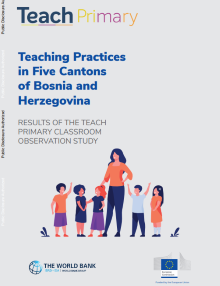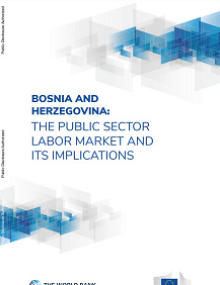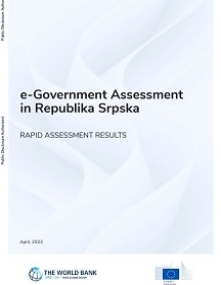Background
The World Bank, in partnership with the European Commission, worked with the governments in Bosnia and Herzegovina (BiH) to strengthen public performance and enhance quality in the provision of public services through the Support to Public Sector Management Reform technical assistance project (P161587). The project was implemented from 2018-2023 and had two components: Component A - Improving public employment data and Component B - Rebalancing staffing and pay in the public sector. These components together supported the project’s mutually reinforcing objectives through the Bank-executed analyses of (i) staffing, pay and service delivery in the largest sectors, namely health and education; (ii) staffing, pay and critical functions at central government levels; and (iii) public sector labor market and its implications.
The Bank’s advice and evidence-based analytics informed significant and challenging public sector reforms to improve the efficiency and productivity both of the central government and key public services such as health and education. The project demonstrated how small interventions across the sectors can showcase where development is possible and make incremental change, even in a country with a complex history and constitutional arrangements such as BiH.
Key interventions included:
- Functional reviews provided recommendations for efficiency and quality improvements in health and education sectors, and for strengthening public institutions for EU accession. In response to COVID-19, the reviews were expanded to focus more on e-Government and digitalization for continued service delivery.
- A public sector labor market study informed by an original household survey provided recommendations on better public sector employment, wage management, and human resource management, and connecting jobs to people.
- The Bank provided analytics and advice on better wage-bill management and the establishment of central registries of public employees in Republika Srpska (RS) and in the Federation of Bosnia and Herzegovina (FBiH) entities.
Key Results
- Governments in BiH endorsed the recommendations and novel approaches to improving workforce management and service delivery in health and education sectors, resulting from the functional reviews.
- The health sector functional review informed the broader health sector reform to improve quality and efficiency of health care, which the governments of the RS and the FBiH are now implementing with the Bank’s financial and technical support. As part of this reform, the RS has integrated 22 primary health care centers and other institutions to the Government’s central treasury system, thus strengthening employment and wage bill controls.
- Building on the Bank’s recommendations for improving efficiency and quality of education services through better workforce management, 30 education specialists and experts selected together with Pedagogical Institutes and Ministries of Education from Sarajevo, Tuzla, Zenica-Doboj, West Herzegovina, and Una Sana Cantons were trained and certified in using the World Bank’s TEACH classroom observation tool. TEACH is a free classroom observation tool that provides a window into one of the less explored and more important aspects of a child’s education: what goes on in the classroom. The tool is intended to be used in primary classrooms (grades 1-6) and it was designed to help countries collect data on teaching practices to improve teaching quality following the Teach Primary framework. Classrooms observations were conducted in 76 primary schools (in both rural and urban areas) covering 379 classrooms and 6,346 students.
- The RS Government adopted legislation on establishing a central registry of government employees, and expressed its interest in continued collaboration with the World Bank to implement its digitalization agenda. The Bank’s new technical assistance activity will support e-government assessment in the FBiH, to inform a roadmap for country-wide digitalization reform.
- The Bank’s recommendations to strengthen critical public administration functions related to policy coordination and human resource management are expected to accelerate the country’s progress on its EU accession path. The recommendations from the public sector labor market study can be used to advance on developing a new jobs agenda.
Publications
Bosnia and Herzegovina - Functional Review of Health Systems (pdf, English)
Drawing on the World Health Organization’s health system framework, the report assesses several functions of health system and provides a set of policy recommendations. The report is based on qualitative interviews and analysis to understand perceptions, challenges, and opportunities within the health system; a review of policy and technical documents; data from multiple sources, such as the Institute of Health Metrics and Evaluation (IHME), the National Health Accounts, published articles and reports, and the World Health Organization and the World Bank Development Indicators. The report begins by providing a brief contextual overview before moving on to an analysis of each health system function and policy recommendations. Chapter 1 considers BiH’s epidemiological profile, as well as the socioeconomic context of the health systems. Chapter 2 will provide analysis and present key challenges with regards to each functional area. Particularly detailed consideration is given to the health care workforce (section 2.3), since this was a focus of the trust fund supporting this work. Finally, Chapter 3 will provide policy recommendations to strengthen access, quality, efficiency, and the sustainability of the healthcare systems in BiH.
This report outlines a strategic approach to introduce pay-for-performance (P4P) incentives for improved noncommunicable disease (NCD) care in Republika Srpska (RS) and the Federation of Bosnia and Herzegovina (FBiH). It intends to provide initial framework for methodological documents to be supported by the World Bank’s Health Systems Improvement Project (HSIP), focusing on evidence-based, technically sound, and politically feasible strategies. Participatorily developed, the report synthesizes global lessons and analyzes the policy environment in RS and FBiH. It proposes key design features, addressing strategic opportunities and operational challenges. Behavioral economics insights and political economy factors inform the approach, identifying key levers, opportunities, and challenges affecting P4P implementation capacity. To enhance NCD care quality, the report recommends changes in the provider payment mix, tailored reforms at entity and cantonal levels, and active service user engagement. Emphasizing the importance of linking payment incentives to performance, the proposed design spans dimensions such as performance measures, basis of payment, payment attributes, recipient of payment, and targeted outcomes. An enabling environment is deemed critical. Relatedly, effective implementation requires robust data systems, stakeholder engagement, adapted legal frameworks, and suitable institutional arrangements. Technical assistance and budgetary support needs are identified. It is expected that P4P implementation will enhance NCD care coverage and quality, thereby improving health outcomes and overall health system performance in RS and FBiH.
Bosnia and Herzegovina - Review of Efficiency of Services in Pre-University Education: Phase I - Stocktaking (pdf, English) | Available in Bosnian (pdf)
This report provides updated analysis on the current distribution of resources in preuniversity education and identifies directions for further policy analysis, but it does not provide comprehensive policy recommendations. This report provides updated available analysis on sector priorities, demographic trends, coverage, system performance and education outcomes, with a focus on the current distribution of resources in pre-university education in selected entities and cantons. It focuses on pre-university education given that it accounts for the vast majority of students and teachers in the system, as well as about 75% of the fiscal resources dedicated to education. The report is based on available administrative data and expenditure and payroll data for RS and FBiH (see Annex 1), though low data availability represents an important limitation. This report divides the analysis into five analytical sections and a final summary of findings. Section II (Context) describes the economic and demographic backdrop for the analysis. Section III (Overview of the Education System) provides a summary of key features of the education system structure in BiH pertaining to governance, quality assurance, and financing. Section IV (Benchmarking Education Outcomes) assesses the performance of the education system in BiH using standard measures of access, equity, quality of service delivery, learning outcomes, and external efficiency. Section V (Efficiency of Resource Use in Education) looks at expenditures and efficiency of spending from a comparative perspective with a focus on staffing and organization of instruction. Section VI (Teacher Development and Management) explores available information on teacher policy and practice as an important link between education spending and service delivery. Finally, Section VII contains a brief summary of main findings. A note on data sources is contained in Annex 1, and additional analyses are contained in Annex 2.
Bosnia and Herzegovina - Functional Review of Education Service Delivery: Phase Two - Strengthening Institutions to Create a More Effective Education Workforce (pdf, English) | Available in Bosnian (pdf)
Strengthening the quality of education is an imperative for social and economic development in Bosnia and Herzegovina (BiH). In support of this objective, the World Bank has concluded a two-stage functional review of the pre-university education sector. Phase one focused on financial resources and efficiency of service delivery, and this report presents results of phase two which focuses on the quality and effectiveness of the education workforce. Preschool enrollment in BiH is especially low at a mere 15%; also, the distribution of education spending is inefficient and inequitable, disproportionately skewed towards personnel leaving little room for school improvement. Still, teachers, the main resource that education systems deploy to support and enhance student learning, lack the necessary support structures to improve performance. Furthermore, the impacts of COVID-19 on the education system exacerbate preexisting challenges and inequities, requiring special attention to restore services and recover learning losses. In line with the issues, this functional review has considered four key school-level elements critical for learning: prepared learners, learning-focused inputs, effective teaching, and skilled management and governance that pulls them all together.

Teach Primary: Teaching Practices in Five Cantons of Bosnia and Herzegovina - Results of the Teach Primary Classroom Observation Study (pdf, English) | Available in Bosnian (pdf)
This study in Bosnia and Herzegovina (BiH) was conducted as part of the Functional Review of Education Service Delivery under the ‘Support to Public Sector Management Reform’ Project and with financial support from the European Commission. Based on recommendations from earlier stages of the Education Functional Review, this technical assistance activity provides targeted support to select jurisdictions in BiH on improving pedagogical practices through classroom observations. Teach Primary is a classroom observation tool that was implemented in five cantons as part of this study: Zenica-Doboj, West Herzegovina, Sarajevo, Tuzla and Una-Sana. School enrollment has increased substantially over the last 25 years in low and middle-income countries. Schooling, basic reading, writing, and arithmetic skills (World Development Report, 2018), a state of affairs UNESCO (2013) dubbed the global learning crisis. Around the world, the learning crisis is, at its core, a teaching crisis. This report details the nature of teaching practices across Bosnia and Herzegovina as captured by the high-inference classroom observation tool, Teach.

Bosnia and Herzegovina: The Public Sector Labor Market and Its Implications (English)
Bosnia and Herzegovina (BiH) face the dual and interlinked challenge of lack of jobs and low quality of public services. Labor force participation rates, especially of women, are among the lowest in Europe, and the country faces high and sustained levels of unemployment, especially of the youth. Even within the employed sector there are concerns regarding the quality of jobs, including high levels of informality. The dearth of quality jobs is linked to skills mismatches between the demand and supply of labor, which in turn reflects the relatively low quality of human capital of workers, and poor education and health services. The objective of this report is to examine the “public sector labor market” in BiH and its implications for this twin challenge. The public sector labor market is defined as the employment, compensation, management, and work environment practices of the public sector. These practices influence the employment choices of individuals, such as whether to work and preferences over public sector or private sector employment. They also affect the selection, retention, motivation, and productivity of public sector workers, which in turn impact the ability of the government to effectively deliver its variety of outputs. The report measures these features of the public sector labor market through an original household survey conducted by the World Bank (WB) in 2021-2022 that is representative of the urban areas of the Federation of Bosnia and Herzegovina (FBiH) and the Republika Srpska (RS).

e-Government Assessment in Republika Srpska: Rapid Assessment Results (English)
Digitalization of the public administration is among the five reform pillars of the RS Government. Alongside the efforts of the RS to modernize its public administration, BiH is implementing an ambitious state-building agenda, driven partly by the aspiration for membership to the EU. The government’s transition to integrated digital solutions offers opportunities for improving productivity, efficiency, effectiveness, responsiveness, and trust in government. This report, which is funded by the EU under the Support to Public Sector Management Reform Project in BiH, presents an assessment of e-services and key enablers that underpin an efficient and user-centric digital government in the RS, including recommendations for further development. The document is organized as follows: section 1 gives introduction. The methodology for the assessment is presented in section 2. The current state of the different foundations is presented in section 3. Finally, section 4 focuses on recommendations and actions to further the digitization agenda in the RS.
